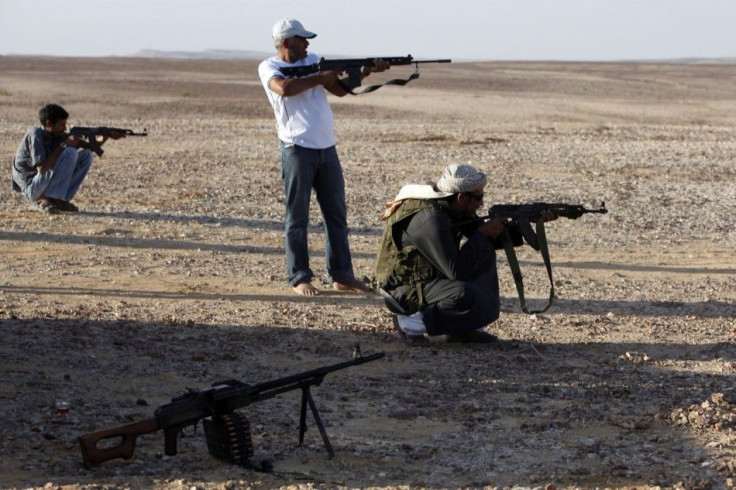What Is Libya's Connection To The Sinai Clashes? Post-Revolution Security Vacuum A Threat To Egypt, Israel

The Egyptian military is tightening their grip over the Sinai Peninsula following an attack by militants on the Egyptian security officers Sunday that killed 16 guards. The crackdown on the suspected Jihadists in the region has brought to focus the 1979 peace treaty between Egypt and Israel and the tumultuous conditions in the region caused due to the fall of several Middle East governments.
Egypt's President Mohamed Morsi, who took office only a month ago, ending an extended period of political uncertainty under the military council, sacked the intelligence Chief Gen Murad Mowafi and the Governor of North Sinai Abdul Wahab Mabruk on Wednesday.
Available information shows that it is not only the transitional period in Egypt that has led to the lawlessness in Sinai, but the conditions in neighboring Libya may have also added fuel to the fire.
The operations carried out by the insurgents revealed that new weapons have entered Sinai, particularly from Libya where illegal arms dealers have been thriving since the fall of Moammar Gadhafi, reported the Egypt Independent.
The report said the flow of weapons to Sinai doubled due to the security vacuum that followed the revolution, quoting Saeid Ateeq, an activist who lives in the town of Sheikh Zowaid, 10 kilometers from the Gaza Strip.
Ateeq explained that the weapons which came from Libya are different from the ones that had already been used in the peninsula before the revolution. "The new ones are of the type used in wars and not in regular clashes." However, he insists that increased arms-flow alone wouldn't have caused a rise in insurgent activity in Sinai, where most residents possess firearms, if not coupled with lack of proper security.
"The inhabitants of the Sinai Peninsula, notably some of its Bedouin tribes, are a heavily armed force that, it would seem, the military rulers of Egypt who had recently stood down were reluctant to challenge," writes Mark Urban, BBC's defense editor.
An unnamed Israeli official on Wednesday said that Sinai militants had acquired weapons from Libya and expressed concern about sophisticated shoulder-to-air missiles that can threaten Israeli aircrafts flying near the border. "There is no shortage of weapons and explosives in Sinai," the official said according to a Jerusalem Post report.
The report said the jihadists groups in Sinai received financial and logistical support from Salafi terror cells in Afghanistan and Iraq. The groups are usually not connected to Iran, which is working to establish its own terrorist infrastructure in Sinai via the Hezbollah.
"These are attacks that are aimed at establishing the groups' reputation and position within Sinai," the Israeli official was quoted saying. The operatives are not subordinate to the Bedouin sheikhs who traditionally own the right to have a say on whatever that happens in the peninsula, the report said.
Israeli intelligence community say that the insurgent attacks are likely to continue and increase in frequency.
Israel has voiced their support for Egyptian crackdown on the insurgent groups, which had recently launched a series of attacks along the Israeli border. Israel said Egypt's military action was a necessary response to keep a check on the growing number of Islamic militants in Sinai and announced its willingness to consider any Egyptian request to deploy additional military forces in the region.
Egyptian media reported on Wednesday that the Army of Islam, a Gaza-based group affiliated with al Qaeda, was behind the attacks. According to Israel, the perpetrators are global jihad operatives, whose common motive is to attack Israel and Egypt, Israeli media reports said.
© Copyright IBTimes 2025. All rights reserved.






















